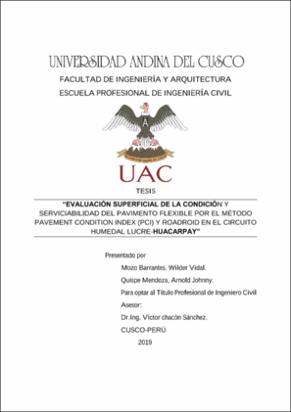| dc.contributor.advisor | Chacón Sánchez, Víctor | |
| dc.contributor.author | Mozo Barrantes, Wilder Vidal | |
| dc.contributor.author | Quispe Mendoza, Arnold Johnny | |
| dc.date.accessioned | 2020-09-28T16:40:08Z | |
| dc.date.available | 2020-09-28T16:40:08Z | |
| dc.date.issued | 2019-12-20 | |
| dc.identifier.uri | https://hdl.handle.net/20.500.12557/3466 | |
| dc.description.abstract | Esta tesis centra su estudio en la evaluación superficial del pavimento flexible en el circuito
humedal Lucre-Huacarpay, el cual es muy valioso debido a que es un lugar de preservación
natural de ecosistemas y diversidad biológica además este espacio es de popularidad
internacional ya que representa el decimoprimer humedal Peruano declarado como sitio
Ramsar. Lo que lo categoriza como un destino atractivo de viajes. La carpeta de rodadura de
este circuito presenta fallas lo que no permite una condición operacional optima ni una
serviciabilidad adecuada para vehículos y peatones es por ello que surge la necesidad de
determinar el grado de deterioro del pavimento flexible y también su índice de serviciabilidad.
Para este fin se hizo uso de dos métodos muy confiables que hoy en día son muy utilizados para
la evaluación de pavimentos, el primero es el método PCI (pavement condition index) el cual
nos proporciona un valor numérico de la condición actual del pavimento flexible y un segundo
método innovador mediante el aplicativo Roadroid para determinar el índice de serviciabilidad.
Para la correcta evaluación se hizo uso de formatos de recolección de datos e instrumentos de
ingeniería. Los resultados de la evaluación del pavimento flexible en esta investigación
expresan que, en los 8.27 km de pavimento se tiene un valor numérico de PCI = 22.87 lo cual
significa que la carpeta de rodadura del pavimento flexible se encuentra en un estado “Muy
Malo” según el rango de calificación de la metodología PCI. Así mismo haciendo uso de la
sistemática del índice de serviciabilidad presente (PSI) mediante el aplicativo Roadroid se
obtuvieron los siguientes valores numéricos de serviciabilidad: PSI= 2.814 (sentido de ida) y
PSI=2.813 (sentido de vuelta) enunciando de esta manera un índice de serviciabilidad
“Regular”. Haciendo la valoración adecuada de los resultados obtenidos se propone como
alternativa de solución una “Rehabilitación Superficial” la cual consiste en la incorporación de
una carpeta delgada de mezcla asfáltica en caliente sobre la superficie existente. | es_PE |
| dc.description.abstract | The investigation is called “SURFACE EVALUATION OF THE CONDITION AND
SERVICE OF FLEXIBLE PAVEMENT BY THE PAVEMENT CONDITION INDEX (PCI)
AND ROADROID METHOD IN THE LUCRE-HUACARPAY HUMEDAL CIRCUIT”
This thesis focuses its study on the surface evaluation of the flexible pavement in the LucreHuacarpay
wetland
circuit,
which
is
very
valuable
because
it
is
a
place
of
natural
preservation
of
ecosystems and biological diversity and this space is of international popularity since it
represents the 11th Peruvian wetland declared a Ramsar site. What categorizes it as an attractive
travel destination. The rolling folder of this circuit has failures, which does not allow for an
optimal operational condition or adequate serviceability for vehicles and pedestrians; therefore,
there is a need to determine the degree of deterioration of the flexible pavement and also its
serviceability index. For this purpose, two very reliable methods were used, which today are
widely used for the evaluation of pavements, the first is the PCI (pavement condition index)
method which provides us with a numerical value of the current condition of the flexible
pavement and a second innovative method using the Roadroid application to determine the
serviceability index. For the correct evaluation, data collection formats and engineering
instruments were used. The results of the evaluation of the flexible pavement in this
investigation express that, in the 8.27 km of pavement there is a numerical value of PCI = 22.87
which means that the rolling pavement of the flexible pavement is in a “Very Bad” state
according to the rating range of the PCI methodology. Likewise, using the systematics of the
present serviceability index (PSI) through the Roadroid application, the following numerical
values of serviceability were obtained: PSI = 2.814 (one way direction) and PSI = 2.813
(direction of return) stating in this way a “Regular” service index. Making the appropriate
assessment of the results obtained, a “Surface Rehabilitation” is proposed as an alternative
solution, which consists of the incorporation of a thin folder of hot asphalt mixture on the
existing surface | en_US |
| dc.description.uri | Tesis | es_PE |
| dc.format | application/pdf | es_PE |
| dc.language.iso | spa | es_PE |
| dc.publisher | Universidad Andina del Cusco | es_PE |
| dc.rights | info:eu-repo/semantics/openAccess | es_PE |
| dc.rights.uri | https://creativecommons.org/licenses/by-nc-nd/2.5/pe/ | es_PE |
| dc.source | Universidad Andina del Cusco | es_PE |
| dc.source | Repositorio Institucional UAC | es_PE |
| dc.subject | Serviciabiliadad | es_PE |
| dc.subject | Pavimento flexible | es_PE |
| dc.subject | Pavimento | es_PE |
| dc.subject | Circulación vehicular | es_PE |
| dc.title | Evaluación superficial de la condición y serviciabilidad del pavimento flexible por el método pavement condition index (PCI) y ROADROID en el circuito humedal Lucre-Huacarpay | es_PE |
| dc.type | info:eu-repo/semantics/bachelorThesis | es_PE |
| thesis.degree.name | Ingeniero Civil | es_PE |
| thesis.degree.grantor | Universidad Andina del Cusco. Facultad de Ingeniería y Arquitectura | es_PE |
| thesis.degree.level | Titulo Profesional | es_PE |
| thesis.degree.discipline | Ingeniería Civil | es_PE |


